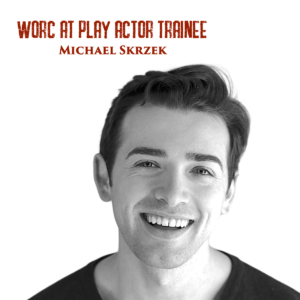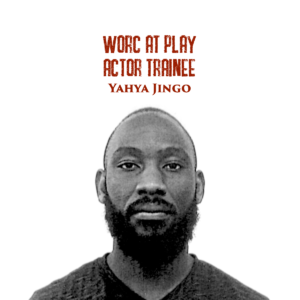Hank Stolz and Ben White spoke with Julius Caesar cast members Yahya Mafumu Jingo, Ellen Lokos and Michael Skrzek. Read on for highlights from the interview, or listen to the full interview below. Then tune in to Talk of the Commonwealth with Hank Stolz on WCRN 830AM Fridays at 9 AM and Saturdays at 1 PM for more behind-the-scenes interviews.
Hank: We are pleased to welcome three local actors that are part of the cast of Julius Caesar and are members of the free Shakespeare actor training program, Worc at Play. We have Yahya Jingo, Ellen Lokos and Michael Skrzek.
Work At Play Actor Trainee Michael Skrzek
Michael, why don’t you give us a little bit of an overview of what’s happening with Julius Caesar and where you guys are in the process right now.
Michael: We’re going to a weekly class with the director for Julius Caesar, Livy Scanlon, every Wednesday night. It’s essentially an acting class based in Shakespeare. We’re not even reviewing the script of Julius Caesar quite yet, but we’re preparing ourselves to be able to handle the verse of Shakespeare once rehearsal starts at the end of June. It’s quite an exciting program because it gives the opportunity for working adults in the Worcester area to be able to get some training under their belt before stepping into a professional production.
Work At Play Actor Trainee Yahya Mafumu Jingo
Hank: This is fantastic. Jingo, tell me a little bit about training for Shakespeare. Tell me about how the language must be delivered conversationally, yet it’s 2021, so it may sound a little bit different.
Jingo: This has been an amazing experience. Stepping into Shakespeare is very new to me, but what I have learned so far is, if I could choose the medium to use as a universal form of communication, I choose theatre. In this training I’ve had with Livy, it portrays a different way of energy, emotion, body movement, breathing and speech. It’s so effective and provides entertainment and excitement that we all so greatly desire. I find it infinitely fascinating.
Work At Play Actor Trainee Ellen Lokos
Hank: This will be a real crowd pleaser, there is a lot of buzz around this right now. Ellen, tell me a little bit about your background that brought you into this experience.
Ellen: I’m a professor at the College of the Holy Cross and I teach Spanish literature. I think there is a lot of buzz around the play and that’s because Julius Caesar is the play that we all need to see right now. It’s going to be very exciting. I love the title of the program, Worc at Play. The fact is, there’s absolutely nothing more serious for an actor than the type of play that we’re engaging in, which leads to the work of understanding Shakespeare and being able to express that beautiful, exquisite language in a way that reaches an audience.
Hank: That’s very interesting, the way in which Shakespeare still speaks to us today. We have these ripples in history, so that something that was written hundreds of years ago, we watch it and we filter it through what’s going on in our world today. It still resonates.
Ellen: It’s going to be a very true and authentic production, but at the same time, extremely accessible to an audience today. One of the things we work on very heavily is language. This is written in a form of poetry called iambic pentameter, not the way we speak today. We continually talk about when we just get out of the way and let Shakespeare’s words speak through us, they’re so eloquent and so beautiful that we cannot help but understand. I think sitting on that common, bringing all the different people of Worcester together, we’re all going to feel an emotional moment.
Speaking to the City
Michael: Having had some classes, I have grown to love the language and the iambic pentameter. Being fairly green to Shakespeare, it was always sort of intimidating to me. If I would read it on a page, I would struggle to make sense of it. I come from a dance background, so I’ve compared it to ballet, speaking the language requires a certain flow and effort behind it. I’m excited that professional Shakespeare actors, along with us trainees at Worc at Play, are going to be able to bring it to the city.
Hank: How is it to learn this language in iambic pentameter and be able to give a natural performance at the same time you’re memorizing things?
Jingo: With my experience particularly, I was very, very green. I didn’t know anything about Shakespeare, especially the language, so it was very strange. Acting has influenced me personally so when I made the choice to join the project, working with Livy taught me the oral communication skills in that kind of language.
It has freed my mind and my heart, and it has helped me to grow as an individual through theatre performing. The character work that I have learned, I have been able to understand emotions and states of mind more clearly.
I also learned my doubts are traitors, they make me lose potential.
Ben: Let’s dive a little bit deeper into the way Livy has taken the diversity that is Worcester and brought together actors with such different backgrounds and experiences to perform along with the professional actors in this production. How has the make-up of the cast and the experiences of Michael being a dancer, Elena a professor and others having all of these different experiences, backgrounds and expertise, how has that added to your understanding of Julius Caesar? How is that going to make the play unique when you perform it out on the Worcester Common?
Jingo: When I look at my colleagues, all being different kinds of people and all different backgrounds, I come from Uganda, we can communicate and understand each other and get a common ground. It is pretty amazing to me. The people I work with make it super easy, I love it.
Ellen: It is my greatest privilege to be involved in this, we talk a great game about diversity every single day, but we don’t very often have the opportunity to do it in a deep and authentic way. I don’t believe I would have had the opportunity to meet this particular set of people, who I now absolutely adore and admire. What people are bringing is so individual, we all have experience in different areas.
Michael: I think it is uniquely Worcester, and I’m a born and raised Worcester native. I am so thrilled with the progress that the city has been making and the renaissance of art culture that we’ve been undergoing. I’m excited to be a part of this inaugural group for the Worc at Play program. With the composition of the cast itself, I mean there’s going to be gender bent roles in this, and people from all walks of life and different backgrounds.
I think it speaks to the timelessness of Shakespeare and how through the ages and through completely different interpretations of the cast and the text, it can still remain relevant.
It is a very exciting thing for the city to be able to participate in a Shakespeare production as it was originally intended, out in the open air for the public to see. I think it is just one of the most incredible things Worcester is going to have to offer after the year we just all went through.



